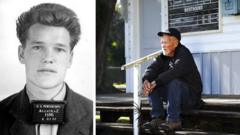As he reminisces about Alcatraz, the sound of passing ships and its eerie quietude linger in Charlie Hopkins' memory. Having served three years in the infamous prison, Hopkins, now 93, reflects on his entrenched past and President Trump's recent ambition to reopen the iconic penitentiary.
Incarcerated at Alcatraz in 1955 for kidnapping and robbery after causing unrest in other correctional facilities, Hopkins recalls the stark and isolated environment, where distractions were scarce, and nights were enveloped in silence. "All you could hear was the whistle of ships; it was a lonely sound," he said.
Recently informed that he might be the last living Alcatraz inmate, Hopkins shared insights into his past life there, recounting experiences with notorious criminals and an unsuccessful escape attempt. Trump’s claims to turn Alcatraz back into a federal prison have stirred discussions; however, historians deem the proposal impractical citing exorbitant renovation costs.
Hopkins, who ultimately left Alcatraz in 1958 when it was still operating at a high-security capacity, expressed skepticism about Trump's intentions. "It would cost billions to revive that place. It’s not feasible," he said, adding that substantial changes would be required for operational safety, especially regarding the outdated sewage system.
Concerted attempts to escape defined many inmates' experiences. Hopkins' own stint in solitary confinement came after his interjection in a plan to liberate fellow prisoners. While some famous escapees from Alcatraz have captured public intrigue, they ultimately faced grim outcomes.
Having left Alcatraz for other facilities and eventually finding a pathway to rehabilitation, Hopkins now leads a quiet life in Florida, with his daughter and grandson. He has also penned a memoir reflecting considerably on his past decisions. He believes that Trump's rhetoric is more about generating dialogue around crime rather than a serious proposal to renovate Alcatraz.
Incarcerated at Alcatraz in 1955 for kidnapping and robbery after causing unrest in other correctional facilities, Hopkins recalls the stark and isolated environment, where distractions were scarce, and nights were enveloped in silence. "All you could hear was the whistle of ships; it was a lonely sound," he said.
Recently informed that he might be the last living Alcatraz inmate, Hopkins shared insights into his past life there, recounting experiences with notorious criminals and an unsuccessful escape attempt. Trump’s claims to turn Alcatraz back into a federal prison have stirred discussions; however, historians deem the proposal impractical citing exorbitant renovation costs.
Hopkins, who ultimately left Alcatraz in 1958 when it was still operating at a high-security capacity, expressed skepticism about Trump's intentions. "It would cost billions to revive that place. It’s not feasible," he said, adding that substantial changes would be required for operational safety, especially regarding the outdated sewage system.
Concerted attempts to escape defined many inmates' experiences. Hopkins' own stint in solitary confinement came after his interjection in a plan to liberate fellow prisoners. While some famous escapees from Alcatraz have captured public intrigue, they ultimately faced grim outcomes.
Having left Alcatraz for other facilities and eventually finding a pathway to rehabilitation, Hopkins now leads a quiet life in Florida, with his daughter and grandson. He has also penned a memoir reflecting considerably on his past decisions. He believes that Trump's rhetoric is more about generating dialogue around crime rather than a serious proposal to renovate Alcatraz.


















